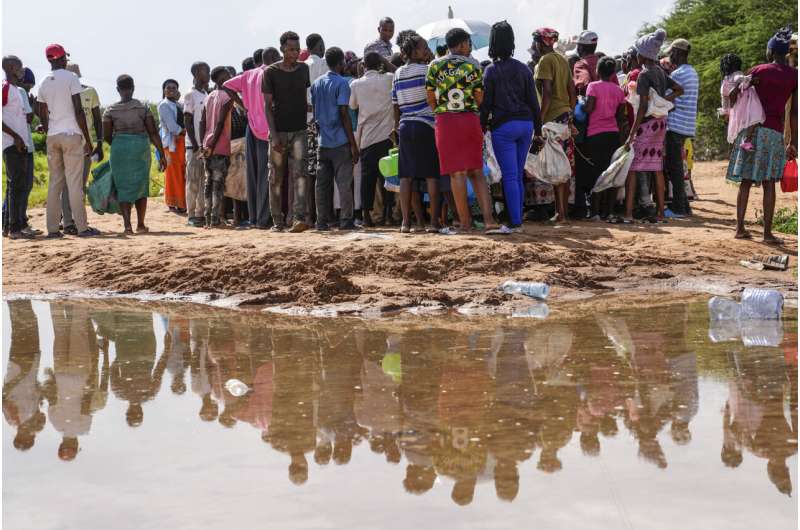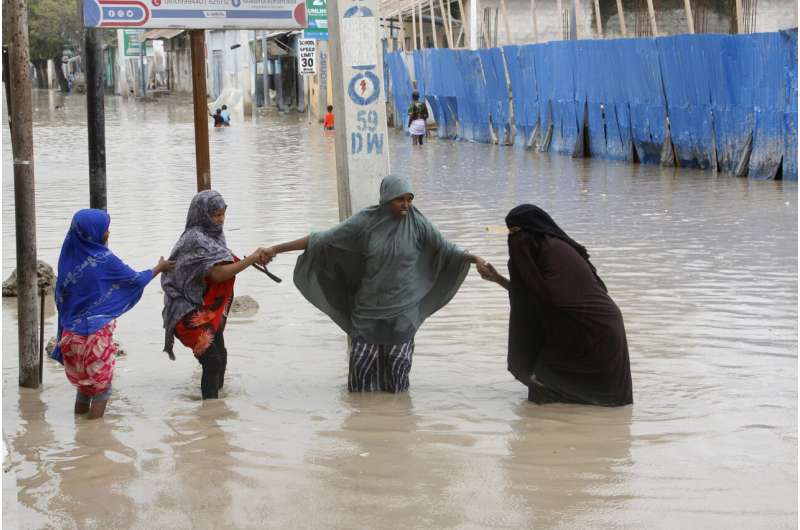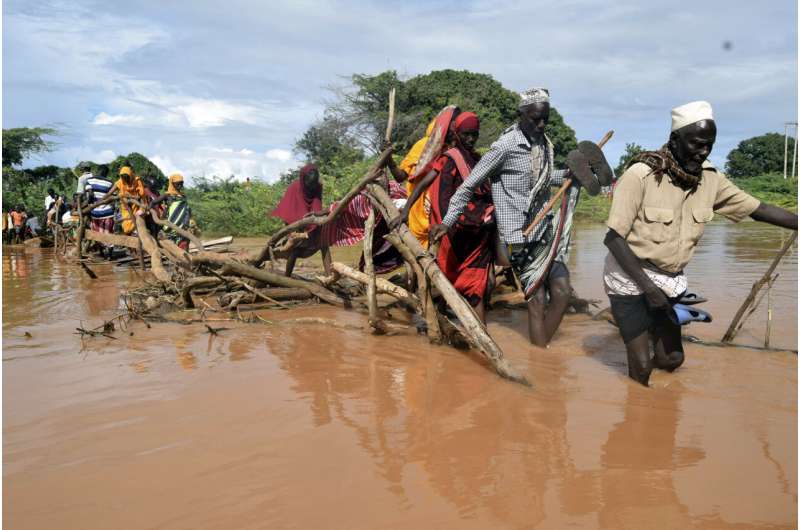This article has been reviewed according to Science X's editorial process and policies. Editors have highlighted the following attributes while ensuring the content's credibility:
fact-checked
reputable news agency
proofread
Scientists: Climate change intensified the rains devastating East Africa

Ongoing catastrophic rains in Eastern Africa have been worsened by human-caused climate change that made them up to two times more intense, an international team of climate scientists said Thursday.
The analysis comes from World Weather Attribution, a group of scientists who examine whether and to what extent human-induced climate change has altered the likelihood and magnitude of an extreme-weather event.
Hundreds of people have died and millions more have been affected since the rains began in October.
October to December is a "short rains" season in Eastern Africa, with the frequency and intensity of the rains influenced by two naturally occurring climate phenomena: El Niño Southern Oscillation (ENSO) and the Indian Ocean Dipole (IOD), which this year have both shaped up to increase the likelihood of heavy rainfall.
To assess how climate change may have affected this year's season, 10 researchers used weather data from the three countries, as well as climate model simulations, to compare how the season has changed in today's climate, which has warmed about 1.2 degrees Celsius (2.2 degrees Fahrenheit), with cooler pre-industrial climate.
They found that the magnitude of the rainfall had nearly doubled due to the global warming. The scientists also said IOD had contributed almost equally to the intensity.
They found the rainfall experienced between October and December to be "one of the most intense ever recorded" in "short rains" seasons over the past 40 years.

Joyce Kimutai, principal meteorologist at the Kenya Meteorological Department and lead author of the study, said the findings stress the dangers of continually warming the planet and the need for humanity to cut down emissions as "whatever we're doing is definitely not on track."
"What the planet is telling us is that 'You're continually warming me, and there's no way I can dispel that heat other than to increase in the way the atmosphere behaves,'" said Kimutai, who is also a researcher at Imperial College London.
The findings show the impact that the burning of fossil fuels, mostly done by rich countries, has on vulnerable populations. The world is experiencing more and more climatic extremes. Greenhouse gas emissions, which trap heat and warm the planet, are increasing to record levels. The World Meteorological Organization said last week that 2023 is almost certain to be the hottest year on record and warned of more worrying climatic events.
Climate change could cause even worse climate extremes than the heavy rainfall being experienced in Eastern Africa, said John Musingi, senior lecturer in climatology and climate change at the University of Nairobi.
"Global temperatures don't need to increase much in order to destabilize the Earth life support system," said Musingi, who was not involved in the study. "Once the climate mature equilibrium is broken it will be catastrophic."
The study also looked at the impact of the heavy rains on communities in the region. The researchers found that people are struggling to deal with the effects of the rains as they are yet to recover from the devastating shocks of a three-year drought that was also exacerbated by climate change. They said increasing risks from extreme weather may strain responses by governments and humanitarian organizations.
Torrential rains and flash floods have caused rampant deaths, displacement, and destruction of infrastructure in parts of Eastern Africa, affecting millions since they began in October.

In Kenya, at least 154 people have died, and nearly half a million have been displaced. In neighboring Somalia, the death toll stood at 110 on Monday, with more than 1 million displaced. And in Ethiopia, the rains had caused the deaths of 57 people and displacement of more than 600,000 as of November 27. And in Tanzania, heavy flooding and landslides in the northern part of the country killed at least 68 people and injured 100 last weekend.
The rains have also caused an increase in cholera and other waterborne diseases in some parts.
"What we are witnessing in Kenya, Somalia, and Ethiopia is yet another devastating blow to an already fragile humanitarian situation," said Melaku Yirga, regional director for Africa at the humanitarian organization Mercy Corps. "Floods have washed away entire villages, wiping out homes, farmlands, and the critical infrastructure necessary to support a swift recovery and movement of people, goods, and much-needed humanitarian aid."
He called on world leaders to honor commitments to assist communities in adapting and coping with challenges posed by climate change.
The situation in Eastern Africa emphasizes an urgent need for climate change adaptation, and a regional approach to address the crisis, said Musavengana Chibwana, regional humanitarian advocacy and policy manager for east and southern Africa at the humanitarian organization Save the Children.
"Just months ago, back-to-back drought in the Horn of Africa and lack of water claimed lives; now, flood waters are doing the same," he said. "This is a clear indication of a climate crisis which is getting worse."
© 2023 The Associated Press. All rights reserved. This material may not be published, broadcast, rewritten or redistributed without permission.





















